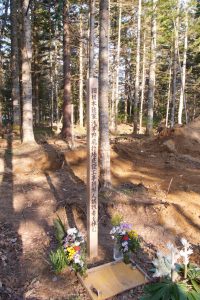Memo #219
By Lukasz Zablonski – zablonski [at] imc.hokudai.ac.jp
 The “remains issue” (ikotsu mondai) refers to controversies surrounding the bodily remains of Korean and Chinese nationals who died during the Asia-Pacific War in Japan and whose bodies have not yet been repatriated. Most were conscripts: soldiers, military personnel and forced labourers. After the War, the remains of Chinese forced labourers were largely repatriated to the bereaved families, but it is estimated that as many as two thousand Korean bodies may still be stored at temples and buried across the country.
The “remains issue” (ikotsu mondai) refers to controversies surrounding the bodily remains of Korean and Chinese nationals who died during the Asia-Pacific War in Japan and whose bodies have not yet been repatriated. Most were conscripts: soldiers, military personnel and forced labourers. After the War, the remains of Chinese forced labourers were largely repatriated to the bereaved families, but it is estimated that as many as two thousand Korean bodies may still be stored at temples and buried across the country.
In accord with the relatives’ wishes, some remains were returned to South Korea, mainly by Buddhist organisations, civil society and local governments. Japanese and East Asian citizens continue to search out wartime remains, but the lack of any Japanese state-sponsored return programs limits their efforts. Official repatriation is preferred by bereaved relatives and the South Korean government, because in addition to being more systematic, it would have to include acknowledgement of forced conscription and apologies for these practices.
During the 2004 Japan-South Korea summit meeting held in Kagoshima Prefecture, Japanese Prime Minister Koizumi Junichiro promised his South Korean counterpart, President Roh Moo Hyun, that “he would look seriously into the matter” and see what could be done to tackle the remains issue. While the agreement prompted the sending of remains of some military conscripts to South Korea, there was no progress in repatriating bodies of Koreans who worked in civilian companies. In 2010, Prime Minister Kan Naoto put the return of the remains of forced labourers back on the agenda, but despite the readiness of monks and activists to contribute, little was done. Given the nationalistic rhetoric of Abe Shinzo, who became Japan’s prime minister in 2012, it seems unlikely that these concerns will be seriously addressed soon.
Against the backdrop of escalating territorial disputes in East Asia and the crisis on the Korean peninsula, legacies of the Asia-Pacific War receive less attention. Yet the failure to address them contributes to continuing tensions, and resolution of the remains issue is important to bereaved relatives, the South Korean government and society, as well as many people in Japan.
About the Author:
Lukasz Zablonski is a PhD candidate at the Graduate School of International Media, Communication, and Tourism Studies, Hokkaido University.

Memorial to Korean forced labour victims in Sarufutsu, Hokkaido. Between 2005 and 2010, remains of 39 forced labourers were exhumed on the site, but they have yet to be returned to the bereaved families in Korea.
Links:
- Ikotsu no sengō. Chōsenjin kyōsei dōin to nihon (Postwar Remains: Forced mobilization of Koreans and Japan), Utsumi Aiko et all, Iwanami bukuretto, Tokyo, 2007.
- Names, Bones and Unpaid Wages (1): Reparations for Korean Forced Labor in Japan, William Underwood, The Asia-Pacific Journal: Japan Focus, 10 September 2006.
- Names, Bones and Unpaid Wages (2): Seeking Redress for Korean Forced Labor, William Underwood, The Asia-Pacific Journal: Japan Focus, 17 September 2006.
- Ikotsu no koe ni kotaeru (Responding to the voice of the remains), Hokkaido Forum for Recognition of Forced Labour and Its Victims, Sapporo, 2009.
Related Memos:
- See our other memos on Japan and South Korea.
Comments are closed, but trackbacks and pingbacks are open.